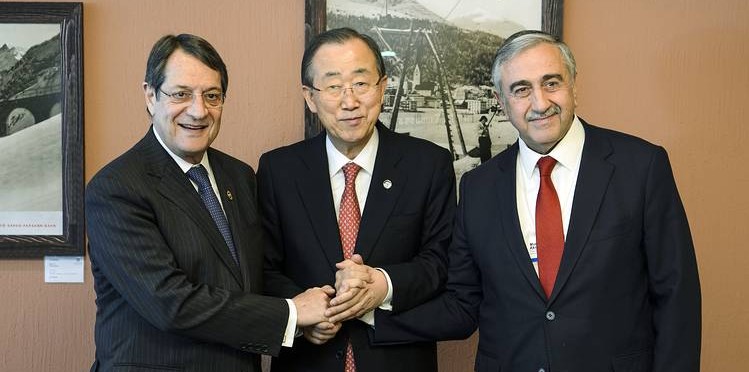PHOTO: Greek Cypriot leader Nicos Anastasiades (left) and Turkish Cypriot leader Mustafa Akinci (right) with UN Secretary-General Ban Ki-moon, January 21, 2016 (AP)
George Kyris — Lecturer at the University of Birmingham and author of The Europeanisation of Contested Statehood: The EU in Northern Cyprus — writes for EA:
In Cyprus, talks between Greek Cypriots and Turkish Cypriots to resolve their decades-long dispute and the division of the island have reached a critical phase. Many observers predict an agreement which will be put up for public vote by the end of the year.
The “Cyprus problem” is one of the most-discussed conflicts in the European Union, but the story of Turkish Cypriots is often missing. The community, in the northern part of the island, puts the spotlight on a peculiar dimension of world politics today and a major challenge for European stability and security: the “States which are not exactly States”.
Europe contains many States whose declared independence is not fully recognized by the international community. Among them are Abkhazia, South Ossetia, Nagorno-Karabakh, and Transnistria — even Kosovo, although far more recognized and integrated in comparison, still lacks complete recognition. Further afield, Palestine, Western Sahara, Somaliland, and Taiwan are also not acknowledged as States.
But it is the self-declared Turkish Republic of Northern Cyprus (TRNC) which is closest to the European Union. Indeed, northern Cyprus is EU territory, at least on paper.
The TRNC was established in 1983 to allow Turkish Cypriots to organize themselves separately from the Republic of Cyprus, dominated by the Greek Cypriots in the south. The 2004 accession of Cyprus into the EU as a still-divided island meant that in practice, European law does not apply in the north.
The EU then started work to help the future European integration of northern Cyprus, when a new, reunified island would replace the Greek Cypriot-dominated Republic as a member state. A decade later, northern Cyprus shows a lot about the limitations but also the opportunities for the EU with involvement in unrecognized states and the regional conflicts to which they are connected.
A Benchmark for Other Areas
The relationship between the EU and unrecognized states is rather challenging. In the case of northern Cyprus it remains, as a local official nicely put it to me, a “platonic relationship”: because the EU does not recognize TRNC, officials say they cannot develop full relations. The EU has not been able to fulfill all of its aspirations in the area: a 2006 proposal for trade with the Turkish Cypriots, is still not implemented amidst fears it could mean a diplomatic “upgrade” of the unrecognized state.
This does not mean that the EU has been completely helpless. Rather than meeting in the ministerial offices of the TRNC, EU and Turkish Cypriot officials gather in Nicosia’s many tavernas. The EU has worked extensively with non-state actors, particularly civil society organizations and the Turkish Cypriot Chamber of Commerce. This peculiar “peoples’ diplomacy”, as one civil society member described it, is an alternative to the formal links through recogniztion.
The EU also has to confront the isolation of the unrecognized state. Turkish Cypriots do not have trade, diplomatic, or political links and remain “embargoed”. To address this, EU money has been spent on international inclusion of Turkish Cypriots through, for example, educational visits to Brussels.
The role of other regional actors should not be ignored. Turkey’s increased economic, political and cultural influence has been particularly challenging for the role of the European Union, with Turkish Cypriots receiving much more money from Turkey than they do from the EU. At the same time, Turkish Cypriot politicians wanting to stand on their own feet rather than rely on Ankara.
Resolution of the Cypriot issue could be an important benchmark for the “States which are not exactly States”. The more recent crisis of Ukraine and the Crimea is another headache for the international community, and it could be joined by demands for an independent Kurdistan — whether solely in Iraq, or also in Syria and Turkey. The status of Kosovo is not resolved.
In his State of the European Union address last week, European Commission President Jean-Claude Juncker said, “Europe is a driving force that can help bring about the unification of Cyprus. We need to get this done. Now.” It is a call with significance far beyond Nicosia.

